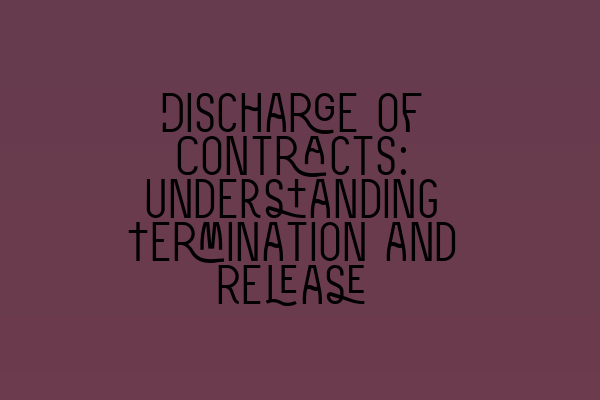Discharge of Contracts: Understanding Termination and Release
Contracts are an integral part of business transactions and personal agreements. They outline the obligations and rights of the parties involved and provide a legal framework for resolving disputes. However, there may be instances where the parties wish to terminate the contract or release each other from their respective obligations. In this blog post, we will explore the concept of contract discharge, specifically focusing on termination and release.
Understanding Contract Discharge
Contract discharge refers to the termination, release, or fulfillment of a contract, resulting in the parties no longer being bound by its terms and conditions. It can occur in several ways, including:
- Performance: When both parties have fulfilled their obligations under the contract, it is considered discharged through performance. This means that each party has completed the tasks or provided the goods or services specified in the contract.
- Agreement: Contracts can also be discharged by mutual agreement between the parties. This may involve renegotiating the terms of the contract or entering into a new agreement altogether.
- Breach: If one party fails to fulfill their obligations under the contract, it may result in a breach. This breach can lead to the termination of the contract and release both parties from their responsibilities.
- Operation of law: Certain events or circumstances, such as impossibility or frustration, can make it impossible to continue performing the contract. In these cases, the contract may be discharged automatically through the operation of law.
Termination of Contracts
Termination is the process of ending a contract before its original completion date. It can be initiated by either party or occur through mutual agreement. Various reasons may lead to contract termination, including:
- Misrepresentation: If one party misled or deceived the other during contract negotiations, it may be grounds for termination.
- Breach of contract: A breach occurs when one party fails to fulfill its contractual obligations. In such cases, the injured party may choose to terminate the contract.
- Non-performance: If one party consistently fails to perform its obligations or achieves only partial performance, the other party may choose to terminate the contract.
- Force majeure: Extraordinary events or circumstances beyond the control of the parties, such as natural disasters or governmental actions, may make it impossible to continue the contract. In such cases, termination may be necessary.
It is essential to follow the proper procedures outlined in the contract or relevant legislation when terminating a contract. Failure to do so may lead to legal complications and potential claims for damages.
For a comprehensive comparison between barristers and solicitors, check out our related article: Barrister vs. Solicitor: A Comprehensive Comparison.
Release from Contractual Obligations
Release refers to the voluntary agreement between the parties to discharge each other from their contractual obligations. It typically occurs when both parties agree to end the contract before performance takes place. A release can be mutual or unilateral, depending on the circumstances.
In a mutual release, both parties agree to terminate the contract and release each other from any further obligations. This may involve settling any outstanding financial matters or agreeing on compensation for the termination of the contract.
In contrast, a unilateral release occurs when only one party is released from their obligations. This may be granted as a favor or due to extenuating circumstances. However, it is essential to ensure that the release is properly documented and executed to avoid future disputes or claims.
For further information on different solicitor specializations and how to find your niche, read our related article: Exploring Different Solicitor Specializations: Finding Your Niche.
Legal Implications and Considerations
When considering termination or release, it is crucial to be aware of the legal implications and potential consequences. Before taking any action, it is recommended to consult with a qualified contract lawyer who can provide guidance based on the specific circumstances and applicable laws.
Furthermore, it is essential to review the contract’s termination provisions, if any, to ensure compliance. Violating these provisions may result in claims for damages or potential legal disputes.
If you are interested in learning more about the rise of virtual law practices and their impact on the legal profession, we have an insightful article for you: Embracing the Rise of Virtual Law Practices.
Real-life case studies can provide valuable insights into legal practice and decision-making. Explore our related article on this topic: Unveiling Real-Life Case Studies: Insights into Legal Practice and Decision-Making.
Lastly, if you are curious about solicitor salaries in the UK and the factors that can affect your income, check out our article that explores this topic in depth: Exploring Solicitor Salaries in the UK: Average Earnings and Factors Affecting Income.
In Conclusion
Discharging a contract through termination or release is an important legal process that allows parties to end their obligations under the contract. Understanding the various methods of contract discharge and the legal implications involved is crucial to avoid potential disputes and ensure a smooth transition.
If you require legal advice or assistance with contract discharge or any other legal matters, please contact our team of experienced solicitors at SQE Contract Law. We are here to help you navigate the complexities of contract law and provide you with expert guidance tailored to your specific situation.
